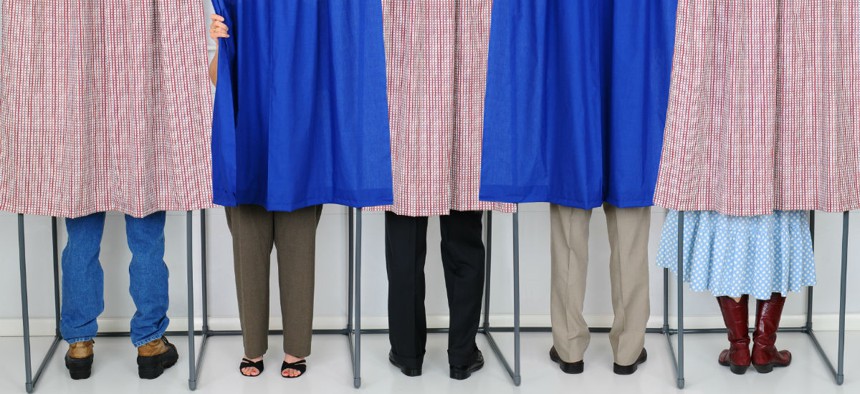
Steve Cukrov / Shutterstock.com
Voters Want Aggressive Government Reform, Not Tinkering Around the Edges
New polling analysis shows a rise in voters who favor dismantling programs.
Eroding confidence in government has shrunk the ranks of reinventing government “tinkerers,” providing an opening for a more-aggressive reform platform for the 2016 election, says a new polling analysis released Friday in a Brookings Institution paper.
Government reform themes likely to emerge during the election boil down to whether the next president should “cut federal programs to reduce the power of government, or maintain existing programs to deal with important problems,” wrote Paul C. Light, professor of public service at New York University. A second key question is whether to “winnow the federal agenda to a smaller set of priorities, or accept the current priorities and focus on reducing federal inefficiency.”
In a new analysis of demographic and ideological groupings, Light observed that “Americans are saying there is something wrong with how government works, though they may not know why, and the drivers are largely negative.” The current political campaigns against government now focus on incompetence, not sloth or the size of government as in the past.
But given the missteps by the Internal Revenue Service, the Secret Service and the Veterans Affairs Department, “People don’t want to hear a message about tinkering, or bringing in help from the private sector or being the most ethical administration in history,” Light said during a luncheon at Brookings. “President Obama’s statement in 2009 that we need a 21st century government that is competent and transparent won’t ignite people today.” Instead, various groups to varying degrees “want a fight.”
Crunching 20 years of polling data, Light posits four voter types: (1) “reinventors” who want to maintain government programs and focus on inefficiency; (2) “streamliners” who want to cut government programs and also focus on inefficiency; (3) “priority-setters” who want to maintain government programs but winnow the federal agenda to their liking; and (4) “dismantlers” who want to cut government programs and also winnow the agenda to their very different liking.
The biggest losers from recent failures by government agencies are the reinventors, who are mostly Democrats, Light noted. “The movement of whites out of reinventing government decreased their presence from 41 percent to 31 percent, while the movement of older Americans into dismantling increased their share from 12 percent to 32 percent,” the paper says. Reinventors were least likely to agree—and dismantlers most likely to agree--with the statements “Government is doing only a fair or poor job, criticism of government is justified, and government needs very major reform.”
The upshot, Light said, is that a campaign promising “competence” is less likely to carry the day than a campaign that is “bold,” as was Jimmy Carter’s people-oriented themes such as civil service reform or Ronald Reagan’s war on waste.
The 2016 winner could be the candidate who brings together two of these groups. For the Republicans, uniting the dismantlers and streamliners might point to a nomination of Wisconsin Gov. Scott Walker or former Arkansas Gov. Mike Huckabee, the scholar said.
But Republicans may go too far in embracing the dismantlers, so Light predicted the candidate best positioned to capitalize on these new attitudes toward government is Democratic front-runner Hillary Clinton. “Her base is the reinventing government types, but she could articulate a progressive agenda and draw in the priority-setters who are the base” of populist Sen. Elizabeth Warren, D-Mass. These voters want firm positions, Light said, “like taxing the 1 percent, or reining in the large banks.”
Light agreed that media coverage is a factor in the dropping trust in government, and that good-news stories about government are rare. But agencies give the media “fodder, the gift that keeps on giving,” he said. “How many times can the Secret Service fail? And I can’t think of a better story for destabilizing public opinion than veterans getting the short end of the stick.”
In fact, Light said, government is generally doing better (with trust rising from 18 percent to 24 percent in the past few years in a Pew Research Center poll). “But the public doesn’t recognize that the onslaught of reports about hiring and technology problems” has overshadowed the “miracles that government achieves every day,” he said.
It would be helpful if the economy got better, Light said, since that causes trust in government to rise.
(Image via Steve Cukrov / Shutterstock.com)
NEXT STORY: Why Did Ted Cruz Miss the Loretta Lynch Vote?







